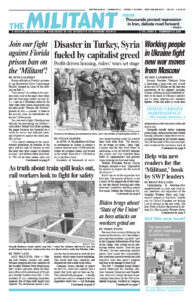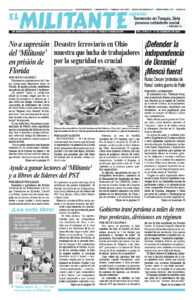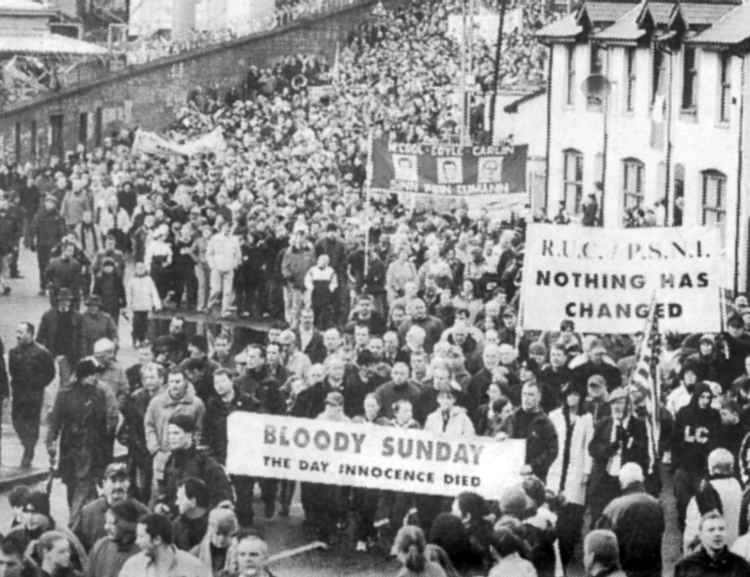MANCHESTER, England — Almost 25 years after the Good Friday Agreement, the British rulers’ grip on Northern Ireland is weaker than ever. Cross-border trade in Ireland has increased, pro-unification forces are gaining momentum and pro-British Unionist parties in Northern Ireland are in crisis.
Last year support for unification was registered when thousands attended meetings in Dublin and Belfast called by Ireland’s Future, which campaigns for a united Ireland. Senior figures from all the main capitalist parties in the Republic attended the Dublin event. Speakers at both meetings included figures with a background in pro-British unionism.
The British rulers divided Ireland against the wishes of its people in 1921, clinging onto the northern six counties after a popular war for independence liberated the rest of the country from their colonial domination. British rule in Northern Ireland rested on discrimination against Catholics and pitting Protestants and Catholics against each other, undermining working-class solidarity there and in the rest of the U.K.
Massive struggles against anti-Catholic discrimination in employment, housing, education and voting rights erupted at the end of the 1960s.
To quell the rising movement, the U.K. government sent thousands of troops to Northern Ireland in 1969. In the following years they carried out massacres of unarmed civilians and London imposed internment without trial. Pro-British gangs conducted murderous anti-Catholic pogroms, frequently in collusion with state forces. The Irish Republican Army waged a military campaign aimed at driving British forces out.
Despite the savage repression meted out by their military, successive Labour and Conservative governments failed to crush the struggle for civil and national rights.
The signing of the 1998 Good Friday Agreement registered advances in the struggle against the second-class status of Catholics and for Irish reunification. The British rulers dismantled much of their repressive apparatus. While Northern Ireland remained part of the U.K., an assembly and power-sharing executive were established with devolved power over health, education and other matters. Both pro-British unionists and Irish nationalists participated. The executive collaborated with the government in Dublin on cross-border issues. An all-Ireland economy grew.
Ireland’s Future meetings
Glenn Bradley told participants at the Ireland’s Future Belfast conference that he’d served five tours in the British Army in Northern Ireland because he wanted to “take the war” to the IRA. He later became an officer of the Ulster Unionist Party.
There is now an “intensive debate” on constitutional change in Northern Ireland, he said. “The only people I can see who are denying that those conversations are taking place,” are the pro-British unionist parties, he said.
As part of the British rulers’ withdrawal from the European Union, the government reached an agreement that kept Northern Ireland in the EU’s customs union, introducing checks on goods to and from Northern Ireland with the rest of the U.K. With trade between the North and the Republic of Ireland unrestricted, an all-Ireland economy continued to grow.
The Democratic Unionist Party, the largest pro-British party, quit the Northern Ireland executive to protest this deal a year ago, blocking the assembly from functioning and forcing an election. This was won by Sinn Fein, an Irish nationalist party, which led the struggle for the country’s reunification for decades and today functions as a bourgeois political party. It is now the largest party in the North and in the South, where it has been prevented from forming a government by a coalition of rival bourgeois parties.
Acknowledging the direction of these changes, Norman Tebbit, a former Conservative Party government minister and staunch opponent of Irish unity, said it was likely “that in the not too distant future the province will become part of the Republic.”
U.K. Prime Minister Rishi Sunak’s government is putting pressure on the Democratic Unionist Party to end its boycott of the assembly. It is also negotiating changes to trading arrangements with the EU, aiming to reduce checks on goods moving between Northern Ireland and the rest of the U.K.
Kyle Paisley, son of Ian Paisley, who was a long-time DUP leader and fierce opponent of Irish unity, told an Irish parliamentary committee that “the Emerald Isle becoming a single political entity is not so easily talked down as it used to be.”
At the Dublin Ireland’s Future meeting, Mary-Lou McDonald, president of Sinn Fein, demanded the Irish government prepare for unification. Irish Prime Minister Leo Varadkar reiterated his support for reunification, but has taken no steps toward organizing a referendum on it.
Amid these developments, workers in Northern Ireland have engaged in labor actions with fellow workers across the U.K. to fight declining real wages and worsening working conditions. Workers from Protestant and Catholic communities, as well as immigrants, are involved. Some 20,000 health workers, members of Unite, Unison and the Northern Ireland Public Service Alliance, joined a one-day strike on Jan. 26, with lively picket lines across Northern Ireland.
Three unions representing the bulk of teachers in Northern Ireland have announced a joint half-day strike Feb. 21. These include the historically pro-British Ulster Teachers Union, the all-Ireland Irish National Teachers Union and a union that organizes teachers across the U.K.
“Decades of struggle dealt an irreversible blow to the divisions between Catholic and Protestant workers,” Peter Clifford, Communist League candidate for Manchester City Council in the May elections, told the Militant. “Workers in Britain should demand Britain get out of Northern Ireland and let the Irish people decide their own future. This will put us in the strongest position to fight for workers and farmers governments here and in Ireland.”
Marnie Kennedy in Belfast contributed to this article


